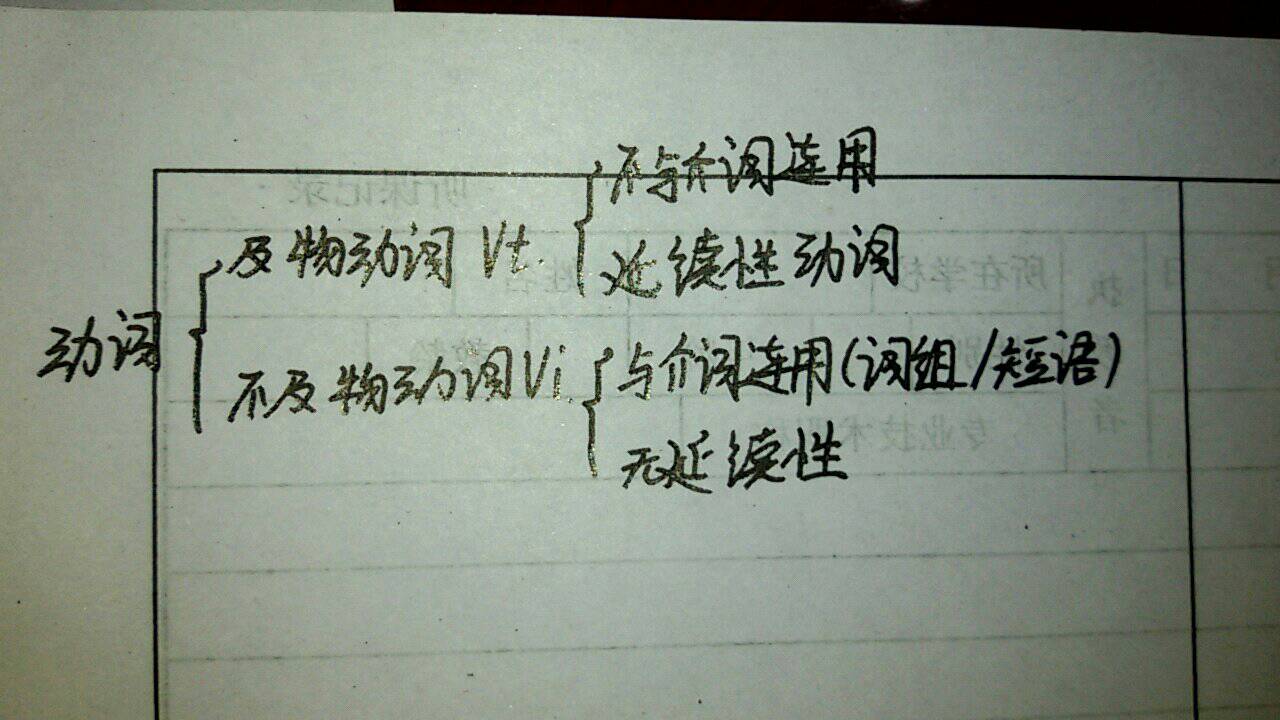劃分標準
及物動詞和不及物動詞的區別在於所帶的賓語不同。不及物動詞只能帶準賓語(動量賓語,時量賓語和數量賓語)。
解析
不及物動詞就是一個動作不能施加到另一個物體上,也就是後面不能加賓語。例如:He is running. run這個
動詞就是不及物動詞,後面不能加sth.(不能說跑什麼東西,但run指運作時是及物動詞,例如:He is running this program now) 分清及物不及物動詞: 分清動詞的及物不及物是在英語學習中必須解決的首要問題。動詞及物與不及物通常有以下幾種情況:
不及物動詞的主要用法
及物動詞後面必須跟
賓語。可以用於:"主+謂+賓";"主+謂+雙賓";"主+謂+賓+賓補"結構。如:
He reached Paris the day before yesterday.
Please hand me the book over there.
They asked me to go fishing with them.
類似的還有:buy,catch,invent,get,found,like,,prevent,promise,raise,find,forget,receive,regard,see,say,seat,supply,select,suppose,show,make,take,tell....
作不及物的動詞
This is the room where I once lived.
類似的還有:agree,go,work,listen,look,come,die,belong,fall,exist,rise,arrive,sit,sail,hurry,fail,succeed....
兩用且意義不同的動詞
如begin 都是作"開始"講。everybody,our game begins. let us begin our game. 類似的還有:start,answer,sing,close,consider,insist,read,learn,prepare,pay,hurt,improve....
這類動詞作
不及物動詞是一個意義;而作及物動詞時卻是另一個意義。如lift作不及物動詞時是指煙霧的"消散"。we saw the mountain when the clouds lifted. 作及物動詞時是"升高;舉起"。
He lifted his glass and drank.
類似的還有:beat vi.跳動 vt. 敲,揍,打; grow vi.生長 vt. 種植
play vi.玩耍 vt. 打(牌、球),演奏 smell vi.發出(氣味) vt. 嗅
ring vi.(電話、鈴)響vt.打電話 speak vi.講話 vt. 說(語言)
hang vi. 懸掛 vt. 絞死 operate vi.動手術 vt. 操作
在英語語法錯誤中,“及物動詞+
介詞+
賓語”(transitive verb+preposition+object),是常見的一種。所謂及物動詞,就是
謂語動詞(predicative verb),不必通過介詞引薦賓語。相反的,
不及物動詞(intransitive verb)是不帶賓語的。有許多
動詞,雖然性質是及物的,但不一定要有賓語,如下列的①a和②a便是這種情形:
如果本質上就是不及物動詞,就不會有
賓語;若要賓語,就要借
介詞之助,一起連用才行(不及物動詞+介詞+賓語),如③b和④b;③a和④a是錯的;
*③a. The children are listening the music.
b. The children are listening to the music.
*④a. She is laughing the crippled man.
b. She is laughing at the crippled man.
反之,及物動詞不必靠介詞,就可以帶賓語,如上述的①b和②b ,又如⑤和⑥:
⑤ John is giving a book to me.
⑥ Who will answer this question?
*⑦ Who will answer to this question?
下列這句從房地產廣告中看到的句子,也犯了同樣的錯:
“We have many buyers awaiting for available units here.”
“awaiting”是個及物動詞,後面的介詞“for”是多餘的,要去掉;不然把“awaiting”改為“waiting”也行。
許多人習慣上喜歡把介詞加到及物動詞後面,然後才帶出
賓語。最常見的是“emphasize/stress on/upon”和“discuss about”,如:
⑧ Singaporeans seem to have emphasized on material gains.
⑨ In our education system,we stress upon examination results.
⑩ World leaders spent a lot of time discussing about worsening economic problems.
顯然的,這三句里的
介詞“on/upon”和“about”是多餘的,不必要的。
錯誤
● The young must obey to their elders.
● Don't approach to that odd-looking man.
● The audience attacked on the rude speaker.
● Do you hope to serve for your nation?
● When did Susan marry with Paul?
介詞“to,on,for,with”都要去掉才對。
為什麼會有這些錯誤呢?主因是分不清楚及物動詞和
不及物動詞的性質。其次,就是對同一個
動詞及其名詞的句型有些混淆。解決之道有二。
第一,要把“及物動詞+
賓語”和“不及物動詞+介詞+賓語”劃分清楚,如:
① I did not answer him./ I did not reply to him.
② He reached London yesterday./ He arrived in London yesterday.
第二,把及物動詞轉化為名詞,然後加上適當的
介詞和賓語,如:
① Don't approach such a person.
②Is oral practice a good approach to language teaching?
區別
及物動詞與不及物動詞的區別
及物動詞
後面必須跟賓語意義才完整的實義動詞,叫做及物動詞(transitive verb)。如:
I believe that the committee will consider our suggestion.我相信委員會將會考慮我們的建議。
“How long can I keep the book”Harry asked.哈里問:“這本書我可以借多久?”
不及物動詞
Birds can fly.鳥會飛。
It happened in June 1932.這件事發生於一九三二年六月。
My watch stopped.我的錶停了。
She spoke at the meeting yesterday evening. 她在昨天晚上的會上發了言。
兩者兼作
a)兼作及物動詞和不及物動詞時,意義不變。試比較:
Shall I begin at once?我可以立刻開始嗎?(begin作不及物動詞)
She began working as a librarian after she left school.她畢業後當
圖書館管理員。(began作及物動詞)
When did they leave Chicago?他們是什麼時候離開
芝加哥的?(leave 作及物動詞)
They left last week. 他們是上周離開的。(left 作
不及物動詞)
b)兼作及物動詞和不及物動詞時,有時意義不盡相同。如:
Wash your hands before meals.飯前要洗手。
Does this cloth wash well? 這布經得起洗嗎?
與漢語比較
有時英語
動詞的及物和不及物的用法,與漢語的用法不一樣,請注意下列兩種情況:
a)有的動詞在英語裡只能用作不及物動詞,而漢語則可用作及物動詞,如arrive到達,agree同意,listen聽。英語裡這些動詞後面常接
介詞。如:
We arrived at the railway station at noon.我們於中午到達火車站。(at不能省去)(比較:We reached the railway station at noon.)
Everybody listened to the lecture with great interest.每個人都很有興趣地聽講課。(to不可省去)(比較:We all heard the lecture.)
Do they agree to the plan?他們同意這個計畫嗎?(to不可省去)
b)有的
動詞在英語裡能用作及物動詞,而在漢語裡則不能用作及物動詞,如serve為…服務。
Our children are taught to serve the people wholeheartedly.我們的兒童被教全心全意為人民服務
如果你想要分得仔細一點就看上面的講解和例句!
誤區示例
go shopping中的go是不是及物動詞?
不及物動詞和及物動詞的區別是能否接賓語,接賓語的是及物動詞,不能接賓語的是不及物動詞,而這裡go shopping中的shopping又不是作go的賓語,只是和go連用構成固定用法,去做某件事情,有很多,如go swimming,go
hiking,goskiing,go skating等,go shopping在這作的是動名詞的形式,所以下次見到由go組成的動名詞形式不要說go是及物動詞喔!

